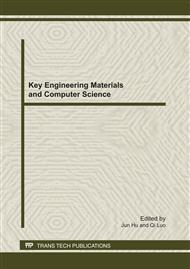[1]
S. Arimoto, S. Kawamura and F. Miyazaki: Bettering operation of robots by learning. Journal of Robotic Systems. Vol. 1(1984), p.123.
DOI: 10.1002/rob.4620010203
Google Scholar
[2]
Hengjie Li, Xiaohong Hao and Weitao Xu: A Fast Parameter Optimal Iterative Learning Control Algorithm. ICESS(2008), p.375.
DOI: 10.1109/wcica.2008.4594444
Google Scholar
[3]
Hengjie Li, Xiaohong Hao and Lei Zhang: A Clonal Selection Algorithm Based Optimal Iterative Learning Control Algorithm. Proceedings of the 7th World Congress on Intelligent Control and Automation(2008), p.927.
DOI: 10.1109/wcica.2008.4594444
Google Scholar
[4]
X. Fang, P. Chen and J. Shao: Optimal higher-order iterative learning control of discrete-time linear systems. IEE Proc. -Control Theory Appl. Vol. 152(2005), p.43.
DOI: 10.1049/ip-cta:20040821
Google Scholar
[5]
J. Hätönen, D.H. Owens, K. Feng: Basis functions and parameter optimisation in high-order iterative. Automatica. Vol. 42(2006), p.287.
DOI: 10.1016/j.automatica.2005.05.025
Google Scholar
[6]
Gunnarsson, S. and M. Norrlof: On the Design of ILC Algorithms Using Optimization. Automatica, Vol. 37(2001), p. (2011).
Google Scholar
[7]
D. Vrabie, O. Pastravanu, M. Abu-Khalaf, F.L. Lewis: Adaptive optimal control for continuous-time linear systems based on policy iteration. Automatica , Vol. 45(2009), p.477.
DOI: 10.1016/j.automatica.2008.08.017
Google Scholar
[8]
Mohammad Reza Nasiri: An Optimal Iterative Learning Control for Continuous -Time Systems. 32nd IECON(2006), p.114.
Google Scholar
[9]
Jian-Xin Xu, Ying Tan, Tong-Heng Lee: Iterative learning control design based on composite energy function with input saturation. Automatica, Vol. 40(2004), p.1371.
DOI: 10.1109/acc.2003.1242541
Google Scholar
[10]
Hongwei Xu, Yanyan Huang: Optimal Iterative Learning Control for Nonlinear Discrete-time Systems. CCIE, Vol. 1(2010), p.190.
Google Scholar
[11]
Hwang D H , Bien Z: Iterative learning control method for discrete time dynamics systems. IEE2D, Vol. 138(1991), p.139.
Google Scholar


